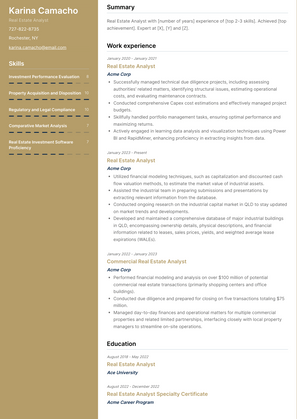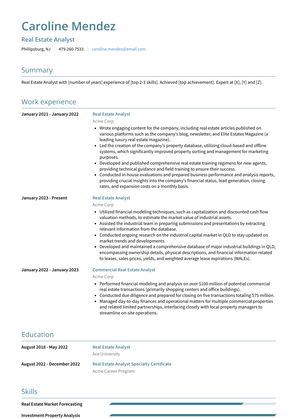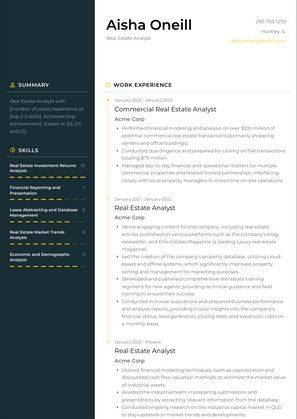3+ Real Estate Analyst Resume Examples and Templates
This page provides you with Real Estate Analyst resume samples to use to create your own resume with our easy-to-use resume builder. Below you'll find our how-to section that will guide you through each section of a Real Estate Analyst resume.



What Do Hiring Managers Look for in a Real Estate Analyst Resume
- Strong analytical skills for evaluating property performance and risks.
- Market research expertise to identify trends and opportunities.
- Financial acumen for investment analysis and valuation.
- Attention to detail in analyzing property data and conducting due diligence.
- Effective communication and presentation skills for conveying insights and recommendations.
How to Write a Real Estate Analyst Resume?
To write a professional Real Estate Analyst resume, follow these steps:
- Select the right Real Estate Analyst resume template.
- Write a professional summary at the top explaining your Real Estate Analyst’s experience and achievements.
- Follow the STAR method while writing your Real Estate Analyst resume’s work experience. Show what you were responsible for and what you achieved as a Real Estate Analyst.
- List your top Real Estate Analyst skills in a separate skills section.
How to Write Your Real Estate Analyst Resume Header?
Write the perfect Real Estate Analyst resume header by:
- Adding your full name at the top of the header.
- Add a photo to your resume if you are applying for jobs outside of the US. For applying to jobs within the US, avoid adding photo to your resume header.
- Add your current position as a Real Estate Analyst to the header to show relevance.
- Add your current city, your phone number and a professional email address.
- Finally, add a link to your portfolio to the Real Estate Analyst resume header. If there’s no portfolio link to add, consider adding a link to your LinkedIn profile instead.
Bad Real Estate Analyst Resume Example - Header Section
Aisha 167 Hamilton Drive Phillipsburg, NJ 08865 Marital Status: Married, email: cooldude2022@gmail.com
Good Real Estate Analyst Resume Example - Header Section
Aisha Oneill, Phillipsburg, NJ, Phone number: +1-555-555-5555, Link: linkedin/in/johndoe
Make sure to add a professional looking email address while writing your resume header. Let’s assume your name is John Doe - here is a formula you can use to create email addresses:
- firstnamelastname@email.com - johndoe@email.com
- firstname.lastname@email.com - john.doe@email.com
- lastname.firstname@email.com - doe.john@email.com
- f.lastname@email.com - j.doe@email.com
- l.firstname@email.com - d.john@email.com
- firstnamelastname12@email.com - johndoe12@email.com
For a Real Estate Analyst email, we recommend you either go with a custom domain name (john@johndoe.com) or select a very reputed email provider (Gmail or Outlook).
How to Write a Professional Real Estate Analyst Resume Summary?
Use this template to write the best Real Estate Analyst resume summary: Real Estate Analyst with [number of years] experience of [top 2-3 skills]. Achieved [top achievement]. Expert at [X], [Y] and [Z].
How to Write a Real Estate Analyst Resume Experience Section?
Here’s how you can write a job winning Real Estate Analyst resume experience section:
- Write your Real Estate Analyst work experience in a reverse chronological order.
- Use bullets instead of paragraphs to explain your Real Estate Analyst work experience.
- While describing your work experience focus on highlighting what you did and the impact you made (you can use numbers to describe your success as a Real Estate Analyst).
- Use action verbs in your bullet points.
Real Estate Analyst Resume Example
Real Estate Analyst
- Utilized financial modeling techniques, such as capitalization and discounted cash flow valuation methods, to estimate the market value of industrial assets.
- Assisted the industrial team in preparing submissions and presentations by extracting relevant information from the database.
- Conducted ongoing research on the industrial capital market in QLD to stay updated on market trends and developments.
- Developed and maintained a comprehensive database of major industrial buildings in QLD, encompassing ownership details, physical descriptions, and financial information related to leases, sales prices, yields, and weighted average lease expirations (WALEs).
Commercial Real Estate Analyst Resume Example
Commercial Real Estate Analyst
- Performed financial modeling and analysis on over $100 million of potential commercial real estate transactions (primarily shopping centers and office buildings).
- Conducted due diligence and prepared for closing on five transactions totaling $75 million.
- Managed day-to-day finances and operational matters for multiple commercial properties and related limited partnerships, interfacing closely with local property managers to streamline on-site operations.
Real Estate Analyst Resume Example
Real Estate Analyst
- Wrote engaging content for the company, including real estate articles published on various platforms such as the company's blog, newsletter, and Elite Estates Magazine (a leading luxury real estate magazine).
- Led the creation of the company's property database, utilizing cloud-based and offline systems, which significantly improved property sorting and management for marketing purposes.
- Developed and published comprehensive real estate training regimens for new agents, providing technical guidance and field training to ensure their success.
- Conducted in-house evaluations and prepared business performance and analysis reports, providing crucial insights into the company's financial status, lead generation, closing rates, and expansion costs on a monthly basis.
Real Estate Analyst Resume Example
Real Estate Analyst
- Successfully managed technical due diligence projects, including assessing authorities' related matters, identifying structural issues, estimating operational costs, and evaluating maintenance contracts.
- Conducted comprehensive Capex cost estimations and effectively managed project budgets.
- Skillfully handled portfolio management tasks, ensuring optimal performance and maximizing returns.
- Actively engaged in learning data analysis and visualization techniques using Power BI and RapidMiner, enhancing proficiency in extracting insights from data.
Top Real Estate Analyst Resume Skills for 2023
- Market Research and Analysis
- Financial Analysis and Modeling
- Investment Property Analysis
- Cash Flow Projections and Valuation
- Feasibility Studies
- Property Due Diligence
- Comparative Market Analysis
- Lease Analysis and Rent Roll Evaluation
- Risk Assessment and Mitigation
- Investment Performance Evaluation
- Real Estate Market Trends Analysis
- Market and Submarket Selection
- Capitalization Rate Analysis
- Property Income and Expense Analysis
- Financial Reporting and Presentation
- Real Estate Investment Strategies
- Real Estate Portfolio Analysis
- Property Tax Assessment Evaluation
- Property Acquisition and Disposition
- Lease Review and Negotiation
- Property Financing Analysis
- Equity and Debt Structuring
- Investment Memorandum Preparation
- Real Estate Investment Software Proficiency
- Asset Management and Performance Monitoring
- Real Estate Asset Valuation
- Property Management Analysis
- Lease Abstracting and Database Management
- Economic and Demographic Analysis
- Real Estate Market Forecasting
- Property Underwriting and Due Diligence
- Lease and Contract Analysis
- Financial Projections and Sensitivity Analysis
- Real Estate Investment Returns Analysis
- Investment Risk Analysis
- Real Estate Market Reporting and Presentation
- Lease Document Review and Evaluation
- Regulatory and Legal Compliance
- Market Research Survey Design and Analysis
- Real Estate Market Entry Strategies
- Real Estate Investment Performance Measurement
- Real Estate Market Assessment and Positioning
How Long Should my Real Estate Analyst Resume be?
Your Real Estate Analyst resume length should be less than one or two pages maximum. Unless you have more than 25 years of experience, any resume that’s more than two pages would appear to be too long and risk getting rejected.
On an average, for Real Estate Analyst, we see most resumes have a length of 2. And, that’s why we advise you to keep the resume length appropriate to not get rejected.
How can I highlight my experience as a Real Estate Analyst on my resume?
To highlight your experience as a Real Estate Analyst, focus on your expertise in market analysis, property valuation, and investment strategy development. Mention specific projects where you have assessed market trends, performed financial modeling, and provided actionable insights for property acquisitions, developments, or sales. Include examples of your proficiency with analytical tools like Excel or real estate software, and any significant contributions to successful real estate investments or portfolio optimizations.
What are the key skills to feature on a Real Estate Analyst's resume?
Key skills to feature on a Real Estate Analyst's resume include market research, financial analysis, data interpretation, and investment strategy. Additionally, highlight your proficiency in using real estate analysis software (such as Argus or CoStar), your ability to prepare detailed reports, and your skills in presenting findings to stakeholders or clients.
How do I demonstrate my ability to analyze market trends on my resume?
Demonstrate your ability to analyze market trends by detailing your experience with monitoring real estate markets, identifying investment opportunities, and predicting future trends based on historical data. Mention specific tools and methodologies you have used for analysis, such as statistical software or comparative market analysis techniques. Highlight any reports or presentations you have prepared that led to strategic decisions or investments.
Should I include metrics on my Real Estate Analyst resume? If so, what kind?
Yes, including metrics on your Real Estate Analyst resume can significantly enhance its impact. For example, you could mention the value of properties you have analyzed, the percentage increase in investment returns due to your recommendations, or the volume of market data you have managed and interpreted. Metrics that demonstrate your analytical precision and contribution to profitable decisions are especially valuable.
How can I showcase my experience with real estate investment strategies on my resume?
Showcase your experience with real estate investment strategies by detailing the types of investments you have analyzed (such as residential, commercial, or industrial properties) and the strategies you recommended based on your analyses. Mention your role in developing financial models, forecasting returns, and assessing risk. Include any successful outcomes, such as investments that achieved high returns or portfolio enhancements.
What kind of achievements should I highlight as a Real Estate Analyst?
Highlight achievements such as significantly improving the accuracy of property valuations, contributing to profitable property acquisitions, or developing innovative analytical tools or methods. You could also mention any awards or recognition you have received for your analytical work or contributions to major projects or transactions.
How do I address a lack of direct experience in real estate analysis on my resume?
If you lack direct real estate analysis experience, focus on transferable skills such as financial modeling, data analysis, and market research from other sectors. Mention any relevant coursework or certifications, such as those related to financial analysis or real estate principles. Highlight your ability to quickly understand and analyze complex data sets, which is crucial for transitioning effectively into real estate analysis.
How important is knowledge of real estate software for a Real Estate Analyst role?
Knowledge of real estate software is crucial for a Real Estate Analyst role, as it allows for the efficient handling of data and automation of complex calculations. Highlight your proficiency with industry-standard software like Argus, CoStar, or other real estate management systems. Mention any specific training or certifications you have in using these tools.
How do I demonstrate my ability to prepare detailed financial reports on my resume?
Demonstrate your ability to prepare detailed financial reports by mentioning the types of reports you've prepared, such as investment analysis reports, quarterly performance reviews, or market trend assessments. Highlight your skills in presenting complex data in an accessible format, ensuring accuracy, and supporting strategic decisions with quantitative evidence.
Should I include certifications on my Real Estate Analyst resume?
Yes, including certifications on your resume can enhance your qualifications as a Real Estate Analyst. Certifications such as the Chartered Financial Analyst (CFA) or Certified Commercial Investment Member (CCIM) can demonstrate your expertise in financial analysis and real estate investment. These certifications show a commitment to professional development and a high level of competency in your field.
-
What Do Hiring Managers Look for in a Real Estate Analyst Resume
-
How to Write a Professional Real Estate Analyst Resume Summary?
-
How to Write a Real Estate Analyst Resume Experience Section?
-
How can I highlight my experience as a Real Estate Analyst on my resume?
-
What are the key skills to feature on a Real Estate Analyst's resume?
-
How do I demonstrate my ability to analyze market trends on my resume?
-
Should I include metrics on my Real Estate Analyst resume? If so, what kind?
-
How can I showcase my experience with real estate investment strategies on my resume?
-
What kind of achievements should I highlight as a Real Estate Analyst?
-
How do I address a lack of direct experience in real estate analysis on my resume?
-
How important is knowledge of real estate software for a Real Estate Analyst role?
-
How do I demonstrate my ability to prepare detailed financial reports on my resume?
-
Should I include certifications on my Real Estate Analyst resume?
Copyright ©2025 Workstory Inc.
